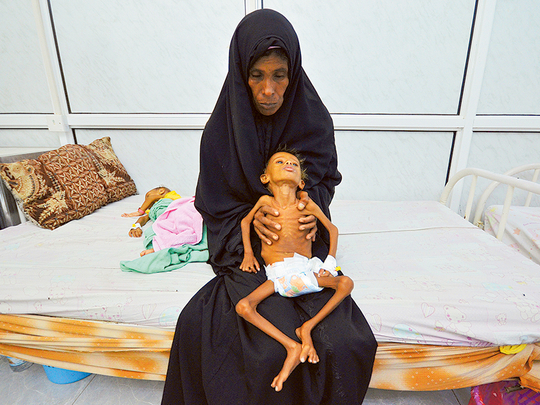
Al Mukalla: Senior army officers and tribal leaders loyal to president Abd Rabbo Mansour Hadi said they cut a vital supply line to Al Houthis in Marib after taking control of a strategic road that connects the town of Serwah with the Al Houthi-held capital, Sana’a.
“We have captured the road that links Serwah with Sana’a. Al Houthis in Serwah have used the road to bring in food, arms and fighters,” Ahmad Al Shalif, the commander of tribesmen backing the army, told Gulf News.
Government forces launched last month an offensive to expel Al Houthis from their last stronghold in the province of Marib. Despite stiff resistance from the rebel forces, the government troops regained control of several hills and the town’s airport. Al Shalif said the capture of the road would effectively lead to cutting the flow of fighters and equipment to pockets of Al Houthis in the town. “They have only one rugged road to Sana’a through Hareb Al Garmesh region. It is hard for them to transport heavy arms on this road.” Al Shalif said, adding that the new victory would have an impact on Al Houthis’ abilities to fight off government forces.
Commanders say the primary goals of their assault in Serwah are securing the city of Marib from Al Houthi rockets fired from the area and opening a new front outside the capital through Khawlan district. With the aerial support from the Saudi-led coalition, commanders think that their forces can march quicker towards the capital through Khawlan.
In the southern city of Taiz, residents said on Wednesday that the rebel forces continued their heavy shelling of the city, a day after one of their rockets landed in a residential area, killing at least ten civilians, including children. “Their hysterical shelling continues for the second day, hitting residential districts like Beir Basha and the Old Airport.” a resident said.
Meanwhile, at least 200 African immigrants, mainly young Ethiopians, were deported on Tuesday from the southern city of Aden, Aden police said in a statement. The Africans were transported on trucks from detention centres in the city and made to board fishing boats. Last month, a similar number of African immigrants were sent back home from Aden. Local authorities fear that the poor Africans are in danger of being radicalised by Al Qaida or recruited by Al Houthis. The influx of African immigrants into Yemen’s coast has continued since early last year despite the continuing war in the country.












